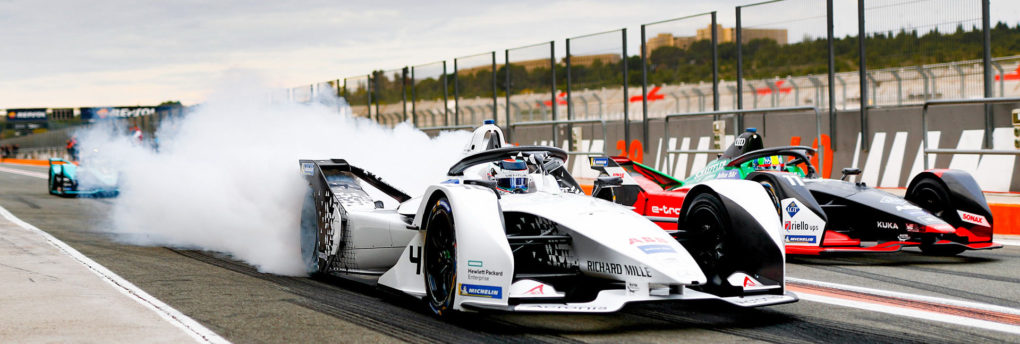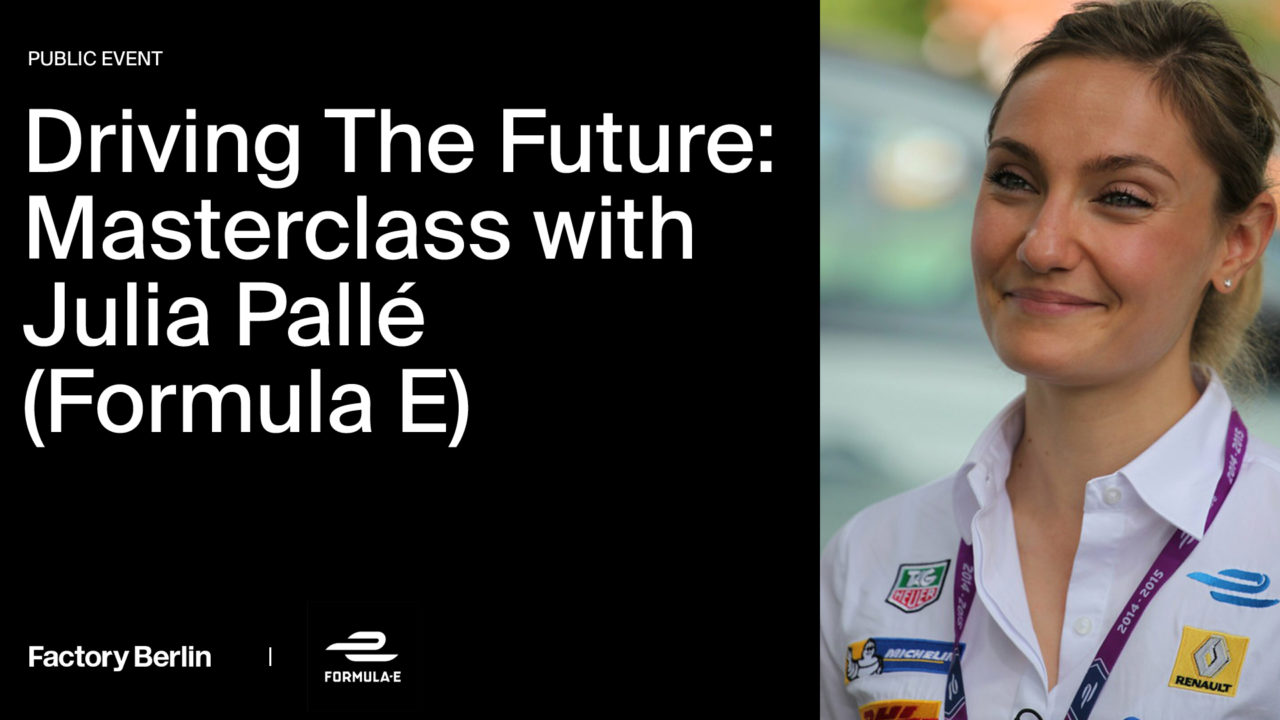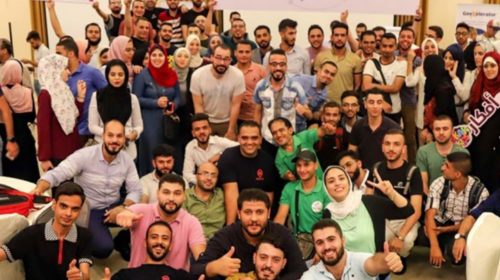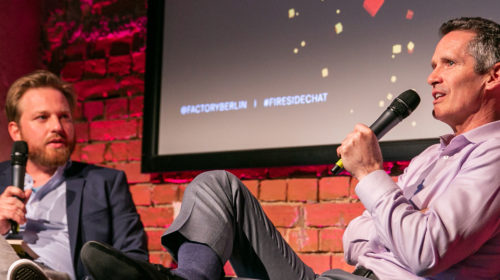
July 31, 2020
Julia Pallé: Driving Formula E’s Sustainability Strategy
Formula E, the world’s first all-electric international single-seater championship, challenged the system and disrupted an industry in the process.
Events Programming Manager Charlotte Hook caught up with Julia after her Factory Berlin Masterclass to learn more about her experiences working at the intersection of industries and how her background prepared her as a pioneer of sustainability in sports.

Charlotte Hook: How did you become passionate about sustainability? Did you always know that that was a topic you would want to become an expert in?
Julia Pallé: Yes, Absolutely. Very early, I knew that’s what I wanted to do. I’ve had the opportunity to study sustainability, which was quite new when I did my studies. That gave me the ability to access these interesting roles, because being qualified in the field makes a huge difference for companies.
CH: How did sustainability in sports come together for you? It’s an unlikely combination. Did sustainability come first or motorsport?
JP: Sustainability came first, but I knew that I wanted to work in heavy industries. I liked the challenge of having a topic that is quite unusual for this kind of industry. If you manage to get them changing, you reduce co2 emissions and you make a positive impact.
I’ve always liked cars but I wasn’t a big Motorsports fan initially. I just had this amazing opportunity to mix these two almost paradoxical topics: sustainability and motorsport. There were so many low hanging fruits that it just made a lot of sense straightaway.
“Someone said the other day and I found it was really relevant: Be a problem solver. If you know an industry, go ahead and preemptively come to them and say, 'Well, I see you guys have a massive problem with plastics, I can help you.'”
CH: Are there a lot of opportunities in sustainability in sports? What’s your advice for people who are trying to break into that field?
JP: Yes, definitely! Especially in the coming years, all sports are going to be trying to define their purpose and that is going to be based around social and environmental sustainability. If you’re qualified and you have a passion for sports, there will be lots of opportunities coming in the market.
Someone said the other day and I found it was really relevant, “Be a problem solver. If you know an industry, go ahead and preemptively come to them and say, ‘Well, I see you guys have a massive problem with plastics, I can help you.'”
CH: In your Masterclass, you said that Formula E has launched an empowerment program ‘Girls on Track’ that aims to bring gender equality and participation in motorsport. What has your experience been as a woman in this field? Is there an increasing number of women participating in sports and sustainability?
JP: When I started my career in motorsport and working for Michelin, I think I was one of the only women in the paddock. I was also really young, so that was also quite unusual. Now, at Formula E, we are lucky to have almost 50:50 gender representation at all levels in the business. I think we even have more women in our Executive team than men. It’s amazing to see the open-mindedness of the sport. I’m sure that there have been some similar trends in the rest of the sporting industry. What I’ve always thought since I was a child is whatever [gender] I am, the most important thing is my brain. That’s the only thing that really matters.

Aus Gründen des Datenschutzes benötigt YouTube deine Erlaubnis zum Hochladen. Weitere Details findest du in unserem Impressum.
Um dieses Video zu sehen, musst du dich für unsere externen Medien anmelden. Du kannst auf “Akzeptieren” klicken, um es für deine Einstellungen zu übernehmen. Du kannst dieses Video auch über einen externen Link ansehen.
CH: One of your first jobs was at Michelin. What were your learnings working on the manufacturer side of sustainability? How are manufacturers thinking about sustainability now?
JP: Manufacturers are thinking about sustainability right in the initial stages, during the conception of the product, which is really interesting. That’s where you see circular economy being integrated. There are a lot of tough environmental certifications that are required – we call that “passport to operate” – if you want to be a manufacturer in Europe. The difference is between the integration in the product conception and the strategy of the business. That’s where there is a gap and where these companies are recalculating the sustainability aspect of their project, and the sustainability vision that they have as leaders in their markets.
CH: It’s been seven years that you’ve been working for Formula E. What has been the greatest challenge along the way and how did you take it in your stride?
JP: The greatest challenge was to create that culture of sustainability within the business. A cultural shift is something really deep and that takes time. You need to be very patient, very stubborn and to truly create synergies. Start building very strong collaborations with your staff and with your exec team. Everyone needs to believe in it. It’s not in a couple of days, or even months, that you can create that.
“What I've always thought since I was a child is whatever [gender] I am, the most important thing is my brain. That's the only thing that really matters.”
CH: What’s next for sustainability in sports?
JP: There is a big wave coming. The sports sector has been chosen by the United Nations as one of the two sectors that have the biggest power to positively impact the world, because of the showcase that it represents. We are not the most (CO2) emitting sector, but we touch the hearts, minds and souls of people. Therefore, we have the capacity to create that shift and that change that movement for people to decide to live a more sustainable lifestyle. We’ll see more and more sports advocating for sustainability and practising what they preach.
CH: And finally, what’s next for you?
JP: There’s so many new things that we’re working on with Formula E and that we are developing. We’ve recently launched a very strong empowerment programme that will be brought to life in season seven around diversity and inclusion. We’ve achieved that maturity phase where everything we needed from an environmental perspective is developed. Now, we can focus ourselves and our efforts more on the social side and I’m really excited to work on this.

